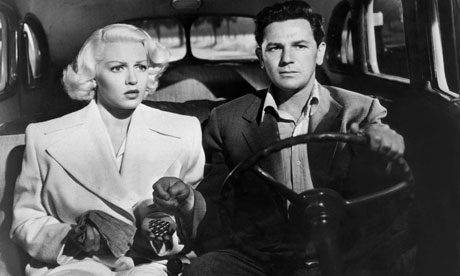
Why is The Postman Always Rings Twice so called? The title seems to have no relevance to the story.
James M Cain suggested the term "postman" was not meant to be taken literally. Rather, the title refers to fate or justice eventually catching up with the perpetrator of a crime, even if they were not punished for the original offence. In Cain's novel (spoilers ahoy) protagonist Frank Chambers helps his lover Cora to kill her husband, but due to machinationsand double-crossing in the courtroom both walk free. However, Cora is later accidentally killed in a car crash and Frank, the driver, is wrongly convicted of murder and sentenced to death. The "postman" whose ring was missed on the first occasion, has "rung" again, and everyone hears his second ring.
In the 1946 film version Frank (John Garfield) has a lengthy and slightly clunky closing speech explaining the meaning of the title to his captors.
David Hering, Liverpool
Snooker tables are much bigger than pool tables, so are snooker players much more skilful than pool players?
Gone are the days when, in 1962, I started shooting pool in Chicago. It was on Brunswick Monarch 5ft x 10ft tables at the midtown Bensinger's, which also featured the still larger billiard tables, and a seemingly giant snooker table. They were apples, oranges and melons – all fruit; all different. Consider champion Willie Mosconi's exhibition run of 526 balls in 1954, and compare it to what? Longer pot shots and a more frequent use of snookering? Both pool and snooker require these skills, though with different emphasis.
With the impact of the film The Hustler, Brunswick sensed a windfall and shortened their tables (making play easier), brightened them (pastel baize) and put them in suburban bowling alleys. To properly enjoy pool you must have the city and the darkness and the outrageous wagers. The excitement of televised snooker championships doesn't exactly compare with personally clearing the table against a mafioso who responds by simply saying: "I won't pay".
To get the scope of the history of these games start with the website of the Chicago Billiard Museum and look at the first alphabetical group of "Chicago Companies".Tolbooth Bob, London N20
I keep hearing two opposing views on medieval and renaissance witch-trials in Europe: first, that many thousands of people (mostly women) were persecuted; the second, that this is a huge exaggeration. What's the truth?
The current academic thinking is that numbers have indeed been exaggerated. Many men and women were put on trial, but the majority were acquitted. The approximate figures are that in England between 1580 and 1660 some 1,000 were sentenced to death by hanging (about a third of them by Matthew Hopkins, the witchfinder general in Essex in the 1640s). Scotland had slightly more, with about 1,300 deaths. This is a relatively modest figure compared to the Germanic states of the Holy Roman Empire, which burned some 50,000 people for witchcraft. Mysteriously, although Spain had the Inquisition in full effect, only 100 people were executed for the crime and in France the figure is around 5,000.
The idea of medieval witchcraft persecution is largely a myth. they mainly kicked off in the 1580s and reached their peak in the 1640s and 50s, at times of great financial and civil unrest.
In England, witchcraft was seen as a crime of maleficia, in which one was charged with harming one's neighbour or their property, such as their dairy cow. It was a secular criminal offence and the penalty was hanging. In Europe, however, witches were thought to fornicate with the Devil, hold black sabbaths, sacrifice babies etc. These were seen as heretical sins and consequently the punishment was burningTo conclude, probably about 100,000 people lost their lives across Europe in the 100 years or so the witch craze lasted, but equally many were charged and acquitted – the trial records survive in many places to show this. People weren't just dragged to the stake; there were rigorous legal procedures, particularly in England.
Freddybear
Professor Pongoo in Edinburgh aside, has there ever been a non-human elected to public office in the UK? Is there any reason why it can't be done?
In Hartlepool they elected H'Angus the Monkey as mayor, only to find it was a human in a monkey costume. Shame.
Simon Field, Stockton-on-Tees
Any answers?
I am now 61. Should I continue to carry an organ donor card? If someone did want my organs, which would be the best bits left?
Alan Payling, Torquay
Given the high profile of Coca-Cola, McDonald's et al at the Olympics, are any international sporting events sponsored by healthy products?
David Boardman, Hebden Bridge
• Post your questions and answers below or email nq@theguardian.com (please include name, address and phone number).

